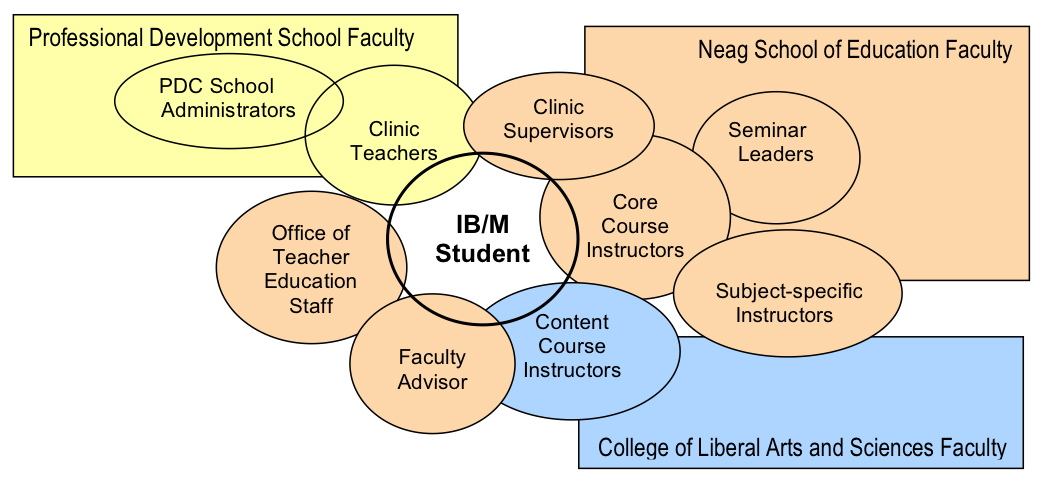IB/M students are part of a team put together to support and enhance their learning and preparation for becoming a teacher.

The IB/M student is supported by several individuals who have interest in their preparation as teachers. Each of the people or groups shown in the diagram can help the student become acclimated to the IB/M program and build a strong knowledge base by facilitating learning through experience, reflection, conceptualization, and experimentation. The student plays the most important role in the learning process. Through the student’s efforts, organization, and full participation, the learning process yields valuable content and experiential knowledge needed by future teachers.
Each student is assigned a faculty advisor who is an expert in the student’s chosen field of concentration. Faculty advisors help students reflect on and capture their learning and continuously challenge teacher education students to learn and grow. Faculty advisors are the best resource for exploring problems of practice and setting development goals.
Other university faculty also serve as resources to IB/M students. The instructors who teach the core courses in the teacher preparation program create learning objectives to help students build a solid foundation in teaching and learning. Core course faculty are available to discuss course content and its applications. Likewise, faculty from the College of Liberal Arts and Sciences are available to help teacher education students develop deep content knowledge. Through the Teachers for A New Era grant, the Neag School of Education has built strong relationships with many CLAS faculty. Many of the core content areas – math, science, english, social studies, and world languages – have specific CLAS faculty representatives who are focused on teacher preparation.
In the second and third years of the IB/M program, faculty who teach subject-specific courses – for example, teaching elementary school science or teaching secondary social studies – serve as a resource to students who are developing and practicing their teaching skills.
As described earlier, the clinic teacher and the seminar leader are available to help students get the most out of their clinic experiences. PDC school administrators often get involved in supporting and guiding IB/M students during their clinic and internship placements. PDC administrators and teachers are interested in seeing that each student gains the most possible value from their work in the schools. Seminar leaders, subject-specific faculty, and others are assigned to provide clinic placement supervision and these supervisors also help the student to experience and reflect on in-school experiences.
Finally, the Office of Teacher Education staff, including the Director of Teacher Education, the Academic Advisory Center Director, the pre-Education Academic Advisor, PDC Coordinators, and the Clinic Placement Coordinator, are always available to help IB/M students, to answer questions, to resolve dilemmas, and to give advice.